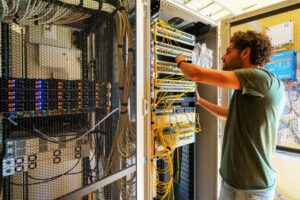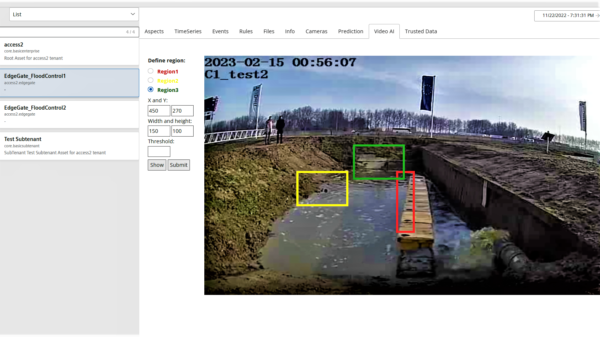Nature’s forces can be devastating. What if 5G-technology could help contain and even prevent disasters? This is exactly what AccessHub is developing: an autonomous system that can have a huge impact on future society. In the past months AccessHub has conducted research with Do IoT Fieldlabs 5G private network.
AccessHub specialises in the development of innovative data-driven services and the further development of camera and sensor systems for IoT applications. In this specific use case, they set up a test with flood management control. “We found some interesting points about 5G”, mentions project leader Maxim Kostin. “It allows us to install some of our AI/CV components in the edge of the 5G-network. In the classical approach, you work with AI in the cloud. The problem is that we need to send several HD video streams in the cloud. The amount of data is so enormous, that it would become very expensive. The outcoming mobile connections are usually much slower than the incoming connections. Sending the video at a very high speed to the edge of the private 5G network opens up an entire world of opportunities.”

Privacy and data protection
“Predicting floods is obviously very relevant in The Netherlands, where several locations suffered some severe floods last year”, explains Maxim. “We worked together with TU Delft’s experts on water management within Flood Proof Holland.” Combining information collected from a large set of sensors and cameras generates a lot of data. In some cases, sensitive data. Data security and privacy protection need to be absolutely guaranteed. Maxim: “We were thrilled to find out that we can achieve a robust solution. Only outcomes of the algorithms and detected events are sent out to external parties, without exposing any sensitive information outside of the system. This looks like a main and very valuable result that we are going to further explore. We are aiming to deploy fully autonomous systems for the detection, prediction and prevention of various natural and industrial incidents and disasters. See it like this: if we can measure it, we can contain it.”
Dry feet
Looking at the close future, Maxim defines the next step: “I think it was quite a successful step for us, because AccessHub has been invited to set up a pilot installation on behalf of a local waterboard. I am very dedicated to make this a success again. Our main focus is to create Trusted Digital Twins. We can implement a lot of things on top of it. So first, we want to help The Netherlands to keep dry feet, as you say in Dutch. But we also see possibilities for monitoring the soil, or emissions in the air… Also elsewhere in Europe. There are countless opportunities. So we are looking forward to further develop the technology, extend the scale, expand the locations and applications. Making use of Do IoT Fieldlab’s facilities and collaborating with the 5G experts from MCS and TNO speeded up the development of our innovations.”
TU Delft will keep track of AccessHub and will assist where needed: these monitoring systems installed in different locations will generate enormous amounts of valuable and trusted data from different sources. This data is of great value to researchers in universities worldwide.

More information
Want to know more?
- Read our project page
- Explanatory leaflet about AccesHub’s Water Flooding Control solution
- Project partners: TU Delft, Edgeway, SmarDTV, AlphaZ Technologies, MCS, TNO, SURF
